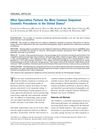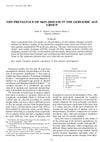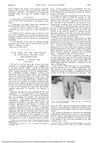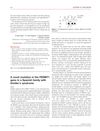 30 citations,
January 2008 in “Dermatologic Surgery”
30 citations,
January 2008 in “Dermatologic Surgery” Dermatologists perform most outpatient cosmetic procedures in the U.S., especially on white women aged 40 to 59.
 254 citations,
September 2014 in “Menopause”
254 citations,
September 2014 in “Menopause” The NAMS 2014 recommendations guide healthcare providers on treating health issues in midlife women, emphasizing individualized care and informed decision-making.
 266 citations,
November 2013 in “European Journal of Epidemiology”
266 citations,
November 2013 in “European Journal of Epidemiology” The Rotterdam Study aims to understand disease causes in the elderly and has found new risk factors and genetic influences on various conditions.
83 citations,
August 2020 in “Resources” Macroalgae compounds offer sustainable, effective benefits for cosmetics.
 39 citations,
June 2017 in “Journal of Applied Research on Medicinal and Aromatic Plants”
39 citations,
June 2017 in “Journal of Applied Research on Medicinal and Aromatic Plants” Plant-based ingredients are effective and safe for modern skincare products.

Skin changes throughout life, from development before birth to aging effects like wrinkles, influenced by both genetics and environment.
 87 citations,
March 2000 in “American Journal of Clinical Dermatology”
87 citations,
March 2000 in “American Journal of Clinical Dermatology” Alpha-hydroxy acids, like glycolic acid, safely improve skin issues and work on all skin types.
 January 2019 in “International Journal of Research in Dermatology”
January 2019 in “International Journal of Research in Dermatology” Skin problems are common in the elderly, with itching and wrinkling being the most frequent issues.
 23 citations,
August 1987 in “Australasian Journal of Dermatology”
23 citations,
August 1987 in “Australasian Journal of Dermatology” Older adults in Ottawa commonly have skin conditions like sun damage, dry skin, and hair loss.
 June 2020 in “IP Indian journal of clinical and experimental dermatology”
June 2020 in “IP Indian journal of clinical and experimental dermatology” Older people more commonly have skin conditions related to aging, and early treatment can improve their quality of life.
 3 citations,
January 2022 in “Biomaterials Science”
3 citations,
January 2022 in “Biomaterials Science” The dressing can track joint movement and speed up healing of joint wounds.
20 citations,
April 2000 in “Experimental dermatology” ODC transgenic mice can model human hair loss with skin lesions.
 55 citations,
September 2017 in “Journal of Cosmetic Dermatology”
55 citations,
September 2017 in “Journal of Cosmetic Dermatology” Platelet-rich plasma, taken from a person's own blood, can help rejuvenate skin, stimulate hair growth, and treat hair loss, but more research is needed to confirm its safety and effectiveness.
 September 1999 in “The Journal of The British Menopause Society”
September 1999 in “The Journal of The British Menopause Society” The document concludes that skin aging in women can be caused by UV exposure and hormonal changes, and treatments like hormone replacement therapy and various skin therapies can help.
 95 citations,
February 2018 in “Dermatology and Therapy”
95 citations,
February 2018 in “Dermatology and Therapy” Nutraceuticals may improve skin health and protect against aging, but more research is needed on their optimal use and possible health risks.

Aging disrupts skin repair and stress responses, but exercise-related IL-15 improves wound healing and skin health in older skin.
 January 2024 in “Journal of tissue engineering”
January 2024 in “Journal of tissue engineering” Sunlight exposure damages hair follicles, but certain stem cell-derived particles can reduce this damage and help with hair regeneration.
 19 citations,
September 2015 in “Therapeutic Delivery”
19 citations,
September 2015 in “Therapeutic Delivery” Active transdermal technologies in cosmetics help deliver skin treatments effectively, but their safety and effectiveness depend on skin type and treatment choice.
6 citations,
November 2022 in “Antioxidants” OR2AT4 helps reduce aging and cell damage in human skin cells.
 January 1996 in “Journal of Dermatological Treatment”
January 1996 in “Journal of Dermatological Treatment” Dermatologists should know about cosmetic science and aesthetics because patients care about skin appearance and health.
 1 citations,
January 2014 in “The journal of advances in parasitology”
1 citations,
January 2014 in “The journal of advances in parasitology” Effective treatment with antiparasitic, antibacterial, anti-inflammatory, and antiallergic medications can lead to recovery in dogs with complicated demodicosis.
 1 citations,
July 2017 in “Journal of evolution of medical and dental sciences”
1 citations,
July 2017 in “Journal of evolution of medical and dental sciences” Older people in Kerala often have skin conditions, with dry skin being the most common, and certain skin issues are linked to high cholesterol and diabetes.
2 citations,
February 2021 in “Developmental Cell” Middle-aged skin shows aging signs, and quercetin might help delay them.
 March 2012 in “Pathy's Principles and Practice of Geriatric Medicine”
March 2012 in “Pathy's Principles and Practice of Geriatric Medicine” Older adults often have skin problems due to aging, and treating these conditions requires attention to both physical and mental health.
 14 citations,
July 2011 in “Clinics in plastic surgery”
14 citations,
July 2011 in “Clinics in plastic surgery” Dermabrasion is a safe, effective way to improve skin appearance with minimal recovery time.
 28 citations,
April 1936 in “Journal of the American Medical Association”
28 citations,
April 1936 in “Journal of the American Medical Association” Aloe vera healed severe skin damage and restored normal skin in five weeks.
 137 citations,
June 2005 in “Climacteric”
137 citations,
June 2005 in “Climacteric” Estrogen loss during menopause worsens skin health, but hormone replacement therapy may improve it, though more research is needed.
 16 citations,
August 2004 in “Tetrahedron”
16 citations,
August 2004 in “Tetrahedron” Scientists made all eight versions of a compound called cyoctol, but found it's not an anti-androgen and it fully breaks down in the skin.
 8 citations,
December 2009 in “Journal of The European Academy of Dermatology and Venereology”
8 citations,
December 2009 in “Journal of The European Academy of Dermatology and Venereology” Researchers found a new mutation in the FERMT1 gene in a Spanish family with Kindler syndrome.
 4 citations,
November 2016 in “Dermatologic Therapy”
4 citations,
November 2016 in “Dermatologic Therapy” Topical tretinoin may increase beard hair density.


























